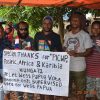
On 29 September numerous media outlets, including The Guardian and ABC News, reported that the head of the United Nation’s Special Political and Decolonisation Committee, Rafael Ramírez, had denied receiving a petiton which called for a free vote on self-determination in West Papua.
This seemingly contradicted Benny Wenda, the exiled West Papuan independence leader, who had told the media that 1.8 million West Papuans had signed the petition that Indonesian authorities had tried to ban and that it had been presented to the UN’s decolonisation committee on 26 September.
Ramírez claimed that “(s)ome people are trying to use me and trying to manipulate or whatever (sic)” and that the decolonisation committee had a very good and strong relationship with Indonesia. In a separate statement, Ramírez said that he supported Indonesia’s position that West Papua was an integral part of its territory.
Predictably the Indonesian Government chimed in by condemning the news reports about the petition and asserted that it was a political stunt lacking all credibility.
On 30 September, The Guardian published a follow up story entitled “West Papua independence petition is rebuffed at UN”.
This news item explains what happened:
(O)n Thursday (28 September) the chair of the decolonisation committee, Rafael Ramírez, said no petition on West Papua could be accepted because the committee’s mandate extended only to the 17 states identified by the UN as “non-self-governing territories”.
I am the chair of the C24 (the decolonisation committee) and the issue of West Papua is not a matter for the C24. We are just working on the counties that are part of the list of non-self-governing territories. That list is issued by the general assembly.
One of the principles of our movement is to defend the sovereignty and the full integrity of the territory of our members. We are not going to do anything against Indonesia as a C24.
West Papua was previously on the committee’s agenda when the former Dutch colony was known as Netherlands New Guinea. However it was removed in 1963 when the province was annexed by Indonesia as Irian Jaya.
So as The Guardian report explains, while the petition was handed over to the United Nations, Ramirez refused to accept it because the committee’s mandate extends only to the 17 states identified by the UN as “non-self-governing territories”.
As MPG’s post on 27 September states, Indonesian security forces are responsible for a wide range of abuses in West Papua including extrajudicial killings, torture, arbitrary detention, excessive use of force and mistreatment and imprisonment of peaceful protesters for demonstrating or expressing solidarity with the independence movement.
It is also the case that legal commentators have been highly critical of the ‘Act of Free Choice’ in 1969, dismissing it as a pseudo-choice and a betrayal of the principle of self-determination.
As West Papuan independence campaigners keep reminding us, the so-called ‘Act of Free Choice’ was effectively an ‘Act of NO Choice’.
In keeping with the principles of justice and international law cited in the UN Charter, it is time for the UN to renounce the ‘Act of Free Choice’ in 1969 and to establish a timetable for an independence referendum to be held in West Papua as happened in East Timor on 30 August 1999.
Notes
For a detailed account of the principle of self-determination in international law, refer to Melinda Janki, ‘A violation of international law’, Inside Indonesia, Dec 20, 2009.